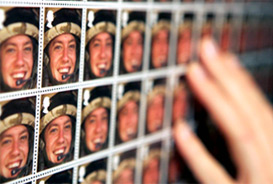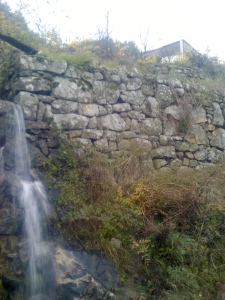I’ve a friend, Mark, who once coined the term ‘synthalpy’ for the next big movement which would wash knowledge management away into the past of tired, failed, organisational managements of once kind or another. Synthalpy is the positive energy which flows when two worlds, hitherto unknown to each other, collide.
When I look around, he gets righter and righter. Except it’s not just two worlds I don’t think. In Saturday’s Guardian was an article about the artist Anri Sala, whose take a drumless recording of a new Franz Ferdinand song, a gallery in London, and fragments from the text of Ulysses by James Joyce. Visitors are asked to record the drum beat. Their instructions are extracts from Ulysses – ‘ bootless’ ‘lickitup’ ‘window-sash’ ‘boo-entity’ with some placing in context of the music. The instruction, in essence, is that the rhythm of the word is the drum beat rhythm which is sought. The artist, Sala, ends the instructions with Joyce ‘With care repeated, with greater difficulty remembered, forgot with ease, with misgiving remembered, repeated with error.’ J
ohn Cage would be proud.I wonder too, what happens in the brain where the rhythm of a word is the instruction to produce a series of beats in a sequence.
I’ve been reading, too, a marvellous book called ‘The Actor and the Target’ by Declan Donnellan, who founded Cheek by Jowl, the theatre company in 1981. Essential reading for anyone interested in work and performance in any settings.I need to read it again, but have been most struck, in my vague meanderings through time and its meaning in organisational settings by his characterisation of Fear (capitalised) in particular. Fear, he says, splits real time into two fake times to avoid you being present. He splits time into the past, riddled with Guilt and the future, infused with Anxiety. The guilty past and the anxious future do not exist, only the present exists.
I notice some move in me, with this and with the time in two modes (mackerel, memory) a lurching away from interest in the future and to being present, ever present.Donnellan also says that acting (but life I think) is about the pursuit of seeing rather than of being seen. Seeing, in the sense of using the faculties to be present and to see fully what is happening.I’ve an embryonic thesis that we mistake, hugely the value of planning and the value of reordering the past with offical, and officious, programmes of evaluation, lessons learnt, business planning, visioning, mission statements – the dross of illusory structure which deludes we are, somehow, captains of the organisational ship and have a choice where we can see it. I’m thinking now that the richness of organisational life unfolds in an acute awareness of the present, an ability to look around and see what is, and, by seeing and describing it well, to open it up lines of sight which are otherwise blocked. I think metaphor is permissable too, with all its dangers, to allow the heightened language to describe complex depths and darknesses which are not otherwise safely explored, or even explored at all. For some things, only the language of metaphor allows access.
This is social constructionism gone mad of course, but not gone bad I don’t think. It does call into question the happier clappier parts of appreciative enquiry, the dreamy bits, imagining Chicago, imagining this, imagining that. But I think that might be necessary. Untrammelled imaginings are whimsical in some way. And I don’t think that’s where the valuable moments happen in the expression of dreams. I could be terribly wrong to do that. But it does not diminish the value of the act of enquiry itself, which appreciative enquiry values so much, and rightly too. I think dreaming belongs in bed at night, and in taut forms, vehicles of expression like theatre, poetry, where the dangerousness or newness or impossibility of the imagining is contained, bounded and made safe for exploration by the traditional forms in which these things are contained.
I think the double unboundedness of sprawling imagining, has less power to make change that either the imaginings bounded in literary or musical forms and compositions which give them density and punch, or by the permission to describe things and be listened to. The presentation of the unthinkable and unsayable in forms which have familiarity and create a certain sense of safety in the listener or viewer to engage seems important.
In the work we’re doing for museums at present, there’s a drumbeat recurring theme about the loss of touch, feeling and rawness in today’s worklife. Museums and archives are used, but in a tidied up, refined way, by interpreters of, say, brand, to package them for accessibility and purvey them to organisations who want things tidy. That’s one trend. Against mess, against the rolling up of sleeves and plunging yourself into the unknown (which is certainly where Fear splits time into two, with great glee). But there’s another trend too, towards treasuring the archive. And for more than just presentation purposes I think. In this world of ephemera and transience where people float in and out of work and work relationships and commitments, some lineage seems more then ever essential. Levi, John Lewis, organisations which are brand-smart, but also thoughtful, are finding that the archives must be made visible and feelable. Not just to plunder them for clever ideas and a kind of pseudo-heritage which might make things feel more solid and permanent. But in a genuine move to treasure and share the inspirational moments from the past so that they come forward and provide inspiration, context and meaning for those who relate to them in the present, which will, in some way change their future.
One person we interviewed said that all work is changing, becoming less linear, more reliant on simultaneity, in the present of a rich resource, in a place of character. These insights prompt me more than ever to the conviction that knowledge is not to be buttoned down, but only exists in the presence of others and in the presence of rich resources. It can only flow and cross gaps. In turn this leads me ever more to the conviction that knowledge is about not-knowledge. I’m taking a look at the negatives of things, the other sides, the shadows, the dark, the blocks, the gaps, the un-things, the not-knowing to see where this leads me.
This goes right back to Declan Donnellan. Acting, he says, is not about the actor, its about the target. The target is not a goal, or objective, or intention, or mission of any kind. Its something that exists outside the actor which fuels the actor. Like dancing with a bamboo stick. You’ll find, if you dance with a stick, that the more you allow the stick to lead, the more graceful, ambitious and dynamic the dance is. Surrender to the stick.
Matisse, and I’ve shared this before, had no idea what he was doing or why when he spent four years carving backs. He did it because it needed to be done. I’m not Matisse, I’m not Declan Donnellan, I’m not an artist of any kind. I’m unlikely to be a writer. I’m most likely to provide some kind of invisible mending and some spaces of invitation and conversation in different settings. But I do recognise the growing need to do something because it somehow needs to be done, rather than need to know why. And what needs to be done by me now is to understand the importance of absenting the future from organisational planning, reconnecting with rawness, and shining a light on the negative, hidden and lurking places which are where knowledge really lies.
I’m not quite sure where this rambling gets me but it feels like something important is flickering at the edges of my vision. I hope David Cooperrider writes in to tell me how wrong I am and persuade me otherwise. Or anyone else for that matter.



You must be logged in to post a comment.